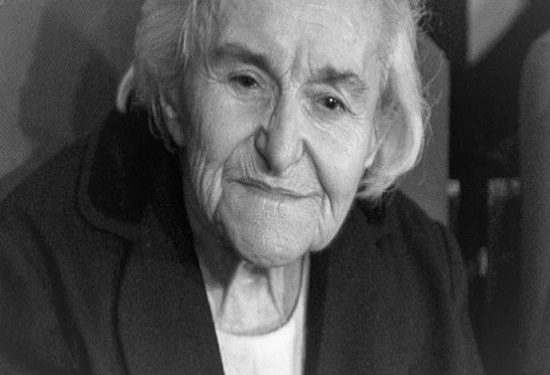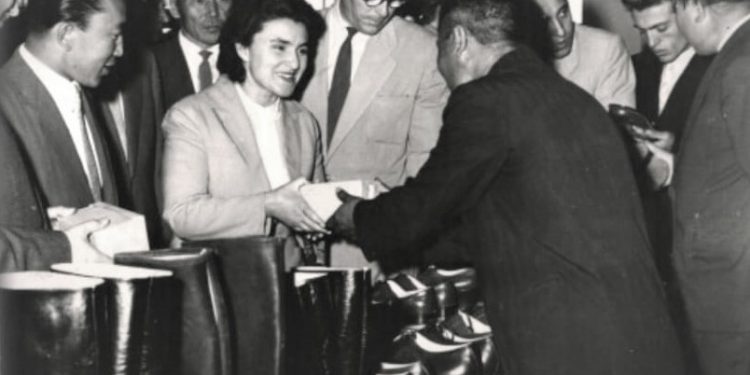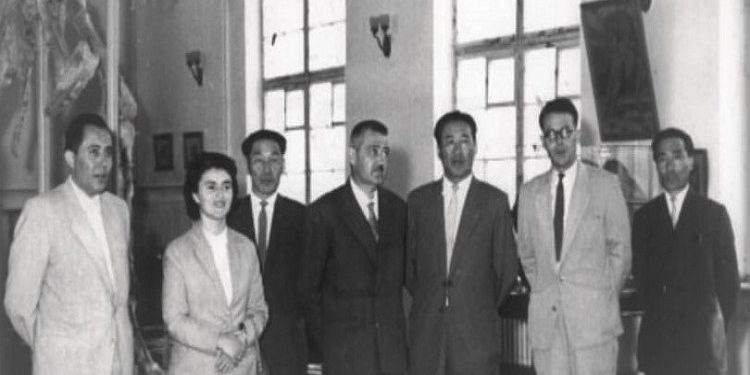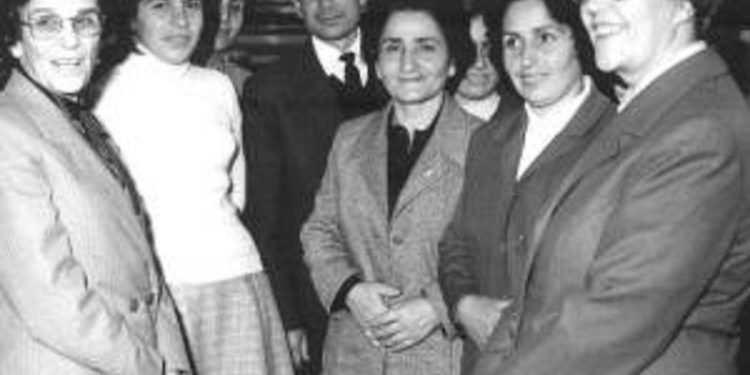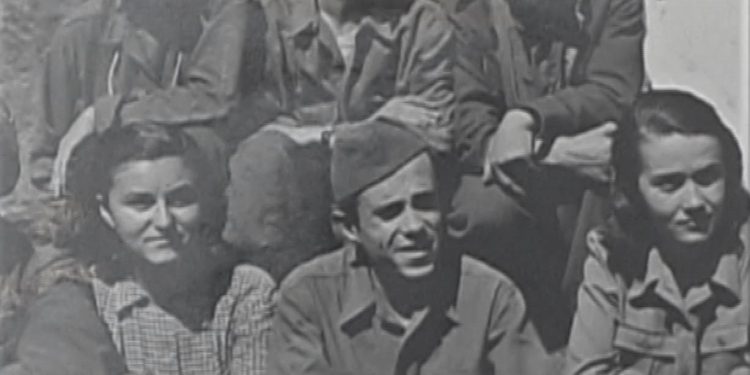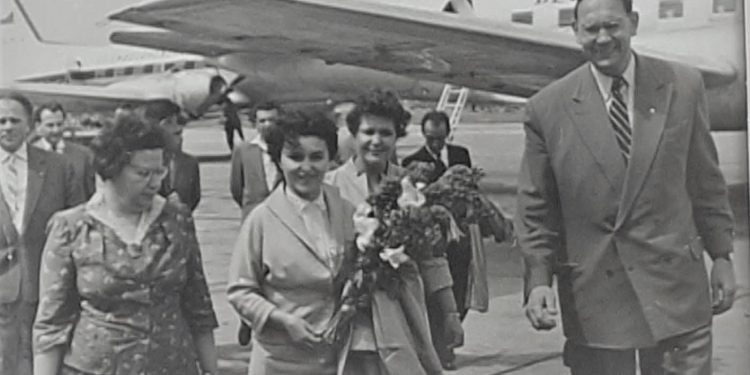By Ilda Lumani
Second part
Memorie.al/ Liri Belishova, former leader of the Communist Anti-Fascist Youth during the War, member of the Political Bureau and secretary of the Central Committee of the ALP for Propaganda until the 1960s, in this interview given a short time ago to be separated from life, has confessed for the first time some of the unknown sides of the period before and after the war, starting with her acquaintances with Ramize Gjebrena, her close friend since they were together at the “Nana Mbretneshë” Women’s Institute in Tirana, Ramizesa’s engagement to Nako Spiro and her tragic shooting, by the command of the 5th Assault Brigade headed by Shefqet Peçin and Hysni Kapo, the role of Enver Hoxha and Miladin Popovic in the elimination of Ramizesa, Nako Spiro’s reports with Enver before and after the War, when and how the contradictions and conflict between them began, the beating and punishment of Liri Belishova after her visit at the head of an official delegation to the Soviet Union and the People’s Republic of China with Haxhi Lleshi in Gogo Nushin, Enver’s accusations against her as an “agent of the Soviets”, the prison sentence of her second husband, Maqo Çomo, and her exile for 30 consecutive years until the collapse of the communist regime, her relationships with Nexhmije Hoxha and Belishova’s dissatisfaction with the book written by Nexhmija, where she and Luan Omari also talk about Ramize Gjebre’s relationship with Misto Mamen, Belishova’s comments about Vasfi Barut’s book, which she considers to be a derogatory book that does not have nothing real in its pages, even her personal life; the losses of loved ones, who were punished by the communist regime because of her, the meeting with Nefo Mufti in Tirana and what she told him about Enver and Nexhmijen, up to her public apology, about her personal responsibility until the period that he was in high positions, and for all the black people who were brought to the communist regime, all Albanians, etc.
Continues from last issue
Ms. Belishova, but why did Enver Hoxha oppose this Congress and called Khrushchev, the Communist Party of the Soviet Union and all other parties that they betrayed Marxism-Leninism?
Everything he said was demagoguery. The goal was to protect his dictatorial seat, because he thought that this anti-Stalinist, reformist, somewhat liberal and democratic path, of peaceful coexistence with the West and avoiding the atomic war that threatened humanity, endangered his communist dictatorship. What harm was coming to the world, and even more so to the Albanian people?
Then my tragedy began. They seemed very fair to me, but I thought how it is possible that Enver Hoxha and other friends do not understand. Am I wrong? But, the main thing was how to protect myself, how not to escape any words, etc. Because, here was not the issue that I would suffer only. My dearest people, my second husband, my four children, my five brothers and their families, my relatives, my husband, I would throw them into hell with my own hands. I ask is there a woman; is there a mother who can do this? I didn’t dare. I thought Enver would finally accept this line. I was not against socialism; I just thought that the right corrections should be made.
My sentence was absurd. In fact, I was against it, but I did not give any facts to be accused of this. I was condemned, as I told the Soviet attaché in Beijing, by the criticism that the leaders of the Chinese Communist Party made of the “traitorous Khrushchev revisionists”. First, I was not the only one at the meeting, but also Gogo Nushi and other members of the delegation. The goal was to propose to the Soviets to convince the Chinese to go to the meeting of the Communist Parties in Bucharest, or to postpone the meeting (we did not have time to ask the Center, because our embassy in Beijing was connected to Tirana through the embassy in Moscow).
This was my “fatal mistake”, which became a big avalanche. And after 22 years, in the book “Titiste”, Enver Hoxha writes another page about me, where he says that; Liri Belishova was convicted as Khrushchev’s agent. Where was it based? Did you forget that I was convicted for political mistakes? In order to give it an agentic color, even the meeting with the Soviet attaché, he presents it as if it was only I and I did it not at the Albanian Embassy, but while going to the Soviet Embassy.
How come there was no one from my former friends to tell him; Hi Enver, did we say otherwise in the Plenum?! Of course, I was angry about this “morality” of the “glorious leader”, but I was not worried at all. Because, I am saying it here with the fullest responsibility, that not only is it not even discussed whether or not I was an agent of the Soviets, but I did not conduct such a conversation without his order or knowledge.
When I think about my life, I see that I have always been dominated by love for Albania and its people. My generation grew up with the traditions of the renaissance, patriotic and democratic, which were then very much alive and fresh. I was brought up like this in my family; my father was a delegate from Mallakastra in the Congress of Lushnja and a gang commander in the War of Vlora, while my mother had learned Albanian from her patriotic uncle, secretly, on the ceiling, in Istanbul and until she died she knew the patriotic songs of the Renaissance and poems of Naim.
We were educated by our patriotic and wonderful teachers, at the primary school and at the “Nana Mbretneshë” Institute. These connected us to communism, mistakenly thinking that this was the right path for Albania’s freedom and its progress. But, these helped me to maintain right attitudes, in important moments.
And, that later I will separate from communism. It is not possible, if you really love your country and your people, to have that minimum of humanistic and democratic feelings that are instinctive in every normal person, and continue to defend the communist dictatorship and Enver, or mitigate the crimes and responsibilities etc.
What I consider I have done well for my people:
- I fought with extraordinary dedication and self-sacrifice against the fascist occupiers, without even sparing my life, even though I was desperate for the loss of my eye. The fact that I, at a very young age, became a member of the Central Committee of the Communist Youth of Tirana, a member of the Provisional Committee that was tasked with directing the party organizations and all other organizations during the terror of the winter of ’43-’44, which then they made me the political secretary of the Central Committee of the Communist Youth, of Tirana and a member of the Central Committee of the Party, then a member of the Central Committee of the Albanian Communist Youth and the Secretariat of the Anti-Fascist Youth, a member of the General Council of Anti-Fascist Women, a candidate for the Committee Central Party, shows how my struggle was evaluated.
- I took a very fair stand for the defense of Albania’s independence and interests from Yugoslav chauvinists. Of course, the main credit goes to Nako Spiros. But how serious the situation was then, it is enough to mention that only 15 days after Nako’s murder, the Political Bureau decided to make the de facto “unification” (swallowing) of Albania with Yugoslavia, in all areas, but the announcement was made when to be the most suitable international conjunctures. No, these and the VIII plenum are not mistakes. They are national treason.
- I took a very fair stand in 1960 on the conflict in the international communist movement between two paths: the Stalinist and the anti-Stalinist and reformist. Enver Hoxha, then with unbridled demagoguery presented the issue as if he was defending Albania’s independence. Albania had been much more dependent on the Soviet Union during the time of Stalin than during the time of Khrushchev, which also did something to improve the ties of the Soviet Union with other socialist countries.
Enver Hoxha, as I said above, was afraid that the anti-Stalinist and reformist path required the softening of repressions, while he wanted his dictatorship as fierce as possible, as it proved. In fact, he did not protect Albania’s independence at all, but greatly endangered it by being hostile to the whole world (at first with imperialism, with the American one at the top, then with revisionism, with the Soviet Union at the top, then also with traitorous China).
Let’s remember here the rampant propaganda, the provocations at the UN, etc. And so, to protect against all these enemies, the loans of China and the accumulation from the great work that the people did, the most significant part, was not used to improve life, but to open tunnels in who knows how many mountains, bunkers in the four corners of Albania, weapons and cartridges that would be enough for all of Europe.
Enveri, all this “great war”, allegedly did it to protect Marxism-Leninism, because “everyone had betrayed him”! Any normal leader of a small country would think about the problems that were arising from real socialism and the measures that had to be taken, he would think that all these leaders of other parties, why they think and decide like that.
And he declared Albania the center of the world proletarian revolution, so he also declared himself the leader of this revolution! Absurd, funny, if it wasn’t tragic. Because for 30 years, while in other socialist countries life became somewhat easier, the opposite happened in Albania. Enveri, in his extremism, surpassed even Stalin.
- I have maintained, together with other friends of the United War Veterans Organization, a fair attitude towards democratic processes. We contributed as much as we had power. We have openly condemned the crimes of the Enverist dictatorship. We also apologized. I call these four my merits.
Responsible before the Albanian people, for everything suffered by the KPSH and APS, are all its members, and even more so those who have been in the leadership, especially those who have personal responsibility for the crimes.
Although I am not personally responsible for the crimes, although I and all my family suffered for 30 years, I have apologized and I take the opportunity to apologize again. I apologize to the victims of the dictatorship and their families for everything they have suffered. I apologize to all the people that we did not realize what we promised during the war, that we avoided it for 50 years from the right path of development, for its poverty and sacrifices, for the repressions and the violation of all rights.
And, I apologize to my loved ones who suffered so much because of me, although I was innocently guilty. First of all, I apologize to my Light, for giving birth to her, but for not being able to provide her with a normal life, without happiness.
Today, after so many years in democracy, do you feel rewarded for your suffering?
The greatest reward is that the Enverist dictatorship was overthrown and Albania is on the right path, that martyred Kosovo was liberated and that other Albanians in the Balkans enjoy more freedom today than ever before in history.
Materially, as a victim, I personally received nothing. However, my late husband and two brothers, Bardhyl and Agron Belishova, who were in prison, were also compensated according to the first Law and especially they are being compensated under the last Law, which is very fair. I receive a very good pension as an invalid of the National Liberation War, my son is a judge, and we also benefited from the properties that my father left us. I live very well, better than when I was a member of the Political Bureau.
And most importantly, I won freedom, me and everyone. Now I meet all my relatives and friends. But can you imagine what it means to live for 30 years isolated as if you had cholera?! To endure all that propaganda, “enemy of the people, enemy of the party” (they counted from Anastas Lulua to Liri Belishova), to listen to the thesis of the institute of Marxism-Leninism that; The Titists used Koçi Xoxen against Albania, while the Khrushchevites used Liri Belishova. What did Liri Belishova do, my God, what was her word or action against Albania, even against the ALP?
The attitude of prisoners, internees and their families has been truly noble. Not only no revenge killings, but no slaps, no insults, after all the atrocities they suffered. I think this is very important, especially if we remember how cruel the communists were without right when they took power.
I call the attitude of the persecuted who were not communists very noble, towards us persecuted who were communists. Let them make a difference, appreciate our attitude and not confuse us with the real ones, appreciate our common suffering. I have many friends, starting with the late Pjetër Arbnori, etc.
I value the attitude of the Democratic Party towards us as very important. They condemned Enver Hoxha and those truly responsible, but appreciated those patriotic communists who fought for the liberation of the homeland from the occupiers, who worked with honor for the good of the people, who, although they had communist illusions, are not responsible for crimes, on the contrary, they themselves suffered from the dictatorship, supported the democratic processes and condemned and continue to condemn the crimes and evils of the Enverist dictatorship.
I don’t believe I will be misunderstood. There are quite a few socialists, even leaders of this party, who have a fair attitude towards us. Without going into details, I consider it necessary to say that it belonged to this party to make a deep analysis of the dictatorship and Enver Hoxha, and not to be satisfied with “distance ourselves from the dictatorship”.
It was up to this party to condemn the crimes and unjust punishments, starting with those committed during the war: Anastas Lulos, Mustafa Gjinishi, Ymer Dëshnica, Sejfulla Malshova, Nako Spiros, etc., of all of us, ex-communists and former leader of that party. One more thing: eight years that the Socialist Party was in power, nothing was done for the politically persecuted, even the bill itself was blocked.
Mrs. Belishova, there have been many discussions: should the files of the Security be opened and why have they been delayed?
We are very late. The files in other former socialist countries have been opened since the beginning of the 90s, immediately after the communist dictatorships were overthrown. I think, in the first place, that all prisoners and internees, by law, should have the right to look at the files that Sigurimi had on them. This is their inalienable right. And other countries have done this.
Opening the files of those who were agents of the Sigurimi will create serious problems, because the Sigurimi had spread its network extremely. But, it is a necessary operation and must be done. Why should we do differently than other countries? I think there are people who have been recruited with tremendous pressure and threats, and opening the files is a severe punishment for them. But let the opportunities to explain and protect be created by law.
The issue that has aroused the opposition of the Socialist Party and some others is the cleaning of the state apparatus, because they say that the Constitution is affected, etc. To be honest, I don’t understand this. Other countries, which are members of the EU, have solved it and their experience can be taken very well. But it is imperative that the state apparatus be purged of those responsible for crimes. It cannot be tolerated that until the Constitutional Court, there are people who have given death decisions for politics, etc. We are too late.
Let’s go back to you, you were a member of the Political Bureau and then ended up in exile. Did you ever think about this persecution that would happen to you?
It is now known to everyone that a communist could be punished and even shot for nothing. But, you understand what I could be thinking, especially after the tragic murder of Nako Spiros. However, as I said above, the most difficult period was the one after the 20th Congress, where I guarded myself with all my might to avoid punishment.
When I returned to Tirana, one day I met Nefo Mufti on the street, who said to me: “What can I say to you, my Liri, who suffered for 30 years. But you know, we have not put our head on a pillow, but like on barbed wire. It seemed to me that Enveri looked at me angrily; it seemed to me that Nexhmija said this word with implication, etc.
Mrs. Belishova, can you tell us your opinion, how is our Albania doing?
If I said that I don’t think about these problems, I wouldn’t be telling the truth, because as I said above, my whole life has been dominated by love and occupation for my country and people. But, I find it very difficult to express myself…! Because, I am mindful of my moral responsibility, which has made me, since I returned to Tirana, decide with other friends not to take an active part in political life.
However, I agree with Ismail Kadare: despite all the problems, mistakes, etc., the important thing is that Albania has entered the right path of democratic development, Euro-Atlantic integration. For the first time, Albania, being a member of NATO, has guaranteed its freedom and independence, while throughout history, we have been the prey of various aggressions, we have suffered from occupations, because we were a small nation. Also, Albania’s entry into the European Union creates many favors for its democratic, economic, etc. development.
Today there are many problems, many flaws, theft, corruption, etc. But, these should in no way evoke despair and pessimism that paralyze the forces. Not only do we learn from philosophers, from history, but also from our experience in the world; nothing is perfect and development is the struggle of opposites. Problems never end; as one part is resolved, others arise. What is important is how it is fought to solve them, first of all by the brain of the nation, but also by all citizens.
I think that the most important thing for Albania is decommunization and democratic culture. Schools and universities, where future citizens are educated, are extremely important to me. All these universities are also very important centers where problems can be studied, proposals made, etc. It is up to them to be the collective advisors of the state, of society.
Dictatorship is a convenient government, like an hourglass. But democracy is complicated like a Swiss watch, all wheels and tools, where everything must work well and in harmony. Memorie.al




